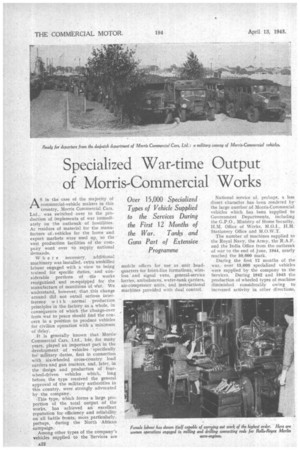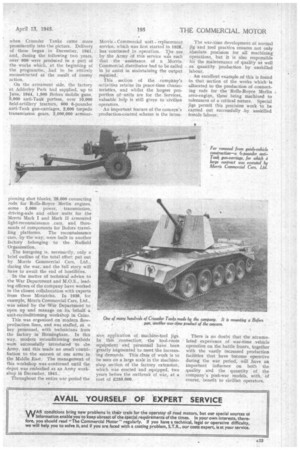Specialized War-time Output of Morris-Commercial Works
Page 24

Page 25

If you've noticed an error in this article please click here to report it so we can fix it.
AS in the case of the majority of commercial-vehicle makers in this country, Morris Commercial Cars, Ltd., was switched over to the production of implements of war immediately on the outbreak of hostilities. Ar, residues of material for the manu facture of. vehicles for the borne* and export markets were used up, so the vast production facilities of the company went over to supply national d email de.
Where necessary, additional machinery was installed, extra unskilled labour engaged witha view to being trained for specific duties, and cOnsiderable portions of the works reorganized and re-equipped for the manufacture of munitions of war. We understand, however, that this change around did not entail serious interference with normal production principles in the factory as a whole, in consequence of which the Change-over from war to peace should find the concern in a position to produce vehicles for civilian operation with a minimum of delay.
It _is generally known that Morris Commercial Cars, Ltd., has, for many years, played an important part in the development of vehicles specifically for military duties, first in connection with six-wheeled cross-country load carriers and gun tractors, and, later, in the design. and production of fourwheel-driven vehicles, which, long before the type received the general approval of the military authorities in this country, were strongly advocated by the company.. This type, which forms a large proportion of the total output of the works, has achieved an excellent reputation for efficiency and reliability on all battle fronts, more particularly, perhaps, during the North African campaign.
Among other types of the company's vehicles supplied to the 'Services are • .&22 mobile offices for use as unit headquarters for front-line formations, wireless and signal vans, general-service lorries, ambulances, water-tank carriers, air-compressor units, and instructional machines provided with dual control. National service of, perhaps, a less direct character has been rendered by the large number of Morris-Commercial vehicles which has been supplied to Government Departments, including the G.P.O., Ministry, of Home Security, H.M. Office of Works, M.O.I., H.M. Stationery Office and M.O.W.T.
The number of Machines supplied to the Royal Navy, the Army, the R.A.F. and the India Office from the outbreak of war to the end of June, 1944, nearly reached the 50,000 mark.
During the first 12 months of the war, over 15,000 'specialized vehicles were supplied by the company to the Services. During 1.942 and 1943 the production of wheeled types of machine diminished considerably owing to increased activity in other directions,
when Crusader Tanks came more prominently into the picture. Delivery of these began in December, 1941, and, during the following two years, over 600 were produced in a part of the works which, at the beginning of the programme, had to be entirely reconstructed aSthe result of enemy action.
On the armament side, the factory at Adderley Park had supplied, up to June, 1944, 1,500 Bofors mobile guns, 5,000 anti-Tank .portees, over 10,000 field-artillery tractors, 600 6-pounder anti-Tank gun-carriages, 2,000 torpedo transmission gears, 2,500,000 armour
piercing shot blanks, 28,000 connecting rods for Rolls-Royce Merlin engines, some 5,000 power, transmission, driving-axle and other units for the Morris Mark I and Mark H i.rmoured light-reconnaissance cars, and thousands of components for Bofors travelling platform's. The reconnaissance cars, by the way, were built in another factory belonging to the Nuffield Organization.
., The foregoing is, necessarily, only a brief outline of the total effort put out by Morris Commercial Cars, Ltd., during the war, and the full story will have to await the end of hostilities. . In the matter of technical advice to the War Department and M.O.S., leading officers of the company have worked in the closest collaboration with experts from these Ministries. In 1938, for example, Morris Commercial Cars, Ltd.., was asked by the Mar Department to open up and manage on its behalf a unit-reconditioning workshop in Cairo.
This was organized -on 'modern flowproduction lines, and was staffed, at o key personnel, with technicians from the factory in Birmingham. In thiS way, modern reconditioning methads were successfully introduced to she Army, and this made no small contribution to the suCcess Of our arms in the Middle Bast. The management of this workshop was continued until the depot was embodied as an Army workshop in December, 1941..
Throughout the entire war period the Morris Commercial unit 'replacement service, which was first started in 1928, has continued in operation. Theuse by the Army of this service was such that the assistance of a MorrisCommercial distributor-had to be called in to assist in maintaining the output reqUired.
This section of the company's activities retains its peace-time characteristics, and whilst the largest proportion of-units are for the Services, valuable help is still given to *civilian operators. An important feature of the concern's production-control scheme is the inten
sive application of machine-tool jig's. In this connection-, the tool-room equipment and, personnel have been greatly augna6nted to meet the increasing demands. This class of work is to be seen on a large scale in the machineshop section of the factory extension, which was erected and equipped, two years before the outbreak of war, at a cost of £250,000.
The war-time development of normal jig and tool practice ensures not only absolute precision for all machining operations, but it is also responsible • for the maintenance of quality as well as quantity production by unskilled labour.
An excellent example of this is found in that section of the works which• is allocated to the production of connecting rods for the Rolls-Royce Merlin aero-engine, these being machined to tolerances of a critical nature. Special jigs permit this precision work to be carried out successfully by unskilled female labour.
There is no doubt that the accumulated experience of war-time vehicle operation on the battle fronts, together with the vastly increased production facilities that have become operative during the war period, will have an important influence on both the quality and the quantity of the company's post-war models, with, of course, benefit to civilian operators.




















































